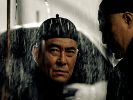Eye For Film >> Movies >> The Grandmaster (2013) Film Review
The sense of choice in Wong Kar Wai's hypnotic The Grandmaster is touch, as he has the earth moving with powdery and glamorous colours decaying at the edges in unremitting longing. Gong Er, in a stupefying performance by Ziyi Zhang, is a martial arts Anna Karenina with fur cuffs as she battles for the family honour in front of a train that, like a never-ending strip of film, flickers in dangerous momentum. Ip Man, the hero of this tale, is played with gravity and remarkable poise by the wonderful Tony Leung, whose tenderness matches his physical art.
Wong Kar Wai knows how to frame faces like no other, with embroidered collars, white straw fedoras, a rowdy monkey, cotton flowers and words escaping lips that are like song.

The beginning is a cipher and remains so. Voice-over informs us that a river divided the traditions of China's North and the South. We witness examples of the choreography in the rain in the backstreets in Foshan in the 1930s and meet Ip Man. "Before 40 living was easy," he says and that he had a wife "with few words" because she knew the value of words. There is fog and smoke above a painting, shifting, switching. Apple green, peach and crimson are the lush fabrics of the interiors. Milky-red lamps light up reflections of honour while questions of succession are at stake.
Red eggs and a baby is born. "The first 40 years was spring" after that - life went straight to winter.
Men socialised in brothels like the Gold Pavilion and Ip Man explains that the pleasure palace "to us was battleground".
The punches, if you see the Grandmaster in a cinema with strong sound, go straight to the stomach. At the start, the whispers and threats, for the kung-fu amateur do not carry much meaning, as the battle dances in the rain impress with sheer strength and beauty of line.
When master from the North Gong Yutian proclaims his retirement, he is curious to meet and challenge Ip Man. His daughter Gong Er, whose face keeps your gaze captive, holds her own.
Ziyi Zhang in a later close-up, with deep red lips, strict hair, and a black and white floral foulard around her neck, makes you forget all other faces on the silver screen. Her character's vow to never get married, never have children and never teach her martial art dissolves into the beauty her code of honour holds in the eyes.
After the two protagonists confront each other for the first time, everything begins to make sense. Emotional courage supports the brilliant choreography. The teachings take shape. "Not to see the good in others limits you," Gong Er learns from her father, who takes the young woman, dressed in blues, along to the brothel, to ask "if you don't see something, does it not exist?" He wants her to become a doctor, because as a woman she can't be his successor and "in life, ability isn't everything".
We learn she is not the only woman fluent in the martial arts, when Sister San emerges from the pearly curtains and jumps down the balustrade to give Ip Man pointers.
Throughout the episodes, group photos freeze history for a second. In a game of matching wits, can you break the cake in the hand?
No one in cinema films embroidery as majestically as Wong Kar Wai. His paillettes and matte beads challenge even the Prada costumed party sequences in Baz Luhrmann's Great Gatsby. Music becomes an additional velvet embrace. Stabat Mater dresses a glance between a couple in combat, a couple never to be.
A challenger is a welcome guest. Ip Man will not see Gong Er's move, called "The 64 hands", as planned during a visit to the North. He takes a family portrait with his wife wrapped in a leopard collar, large and luxurious and no protection from the future ahead. War invades Foshan in October 1938, Ip Man refuses the offer by the Japanese to collaborate. He pays dearly in a time when three million people starved, and loses everything.
We find our hero again in 1950 Hong Kong. A coat button he nails to the wall for keepsake remains the only physical currency of his past. His skill is ever present.
Images of fading purple plaid tell the story of dishonorable involvement in the Chinese puppet government that end the reign at the Gong family compound.
"You're just a woman. You don't count," the villain Ma San, played by Jin Zhang, sporting a sharp Errol Flynn moustache, says to the heroine in a flashback. Nobody in a movie in 2013 gets away with saying this (although too many characters in other films get away with acting this way without being called out for it). Gong Er, of course, eventually avenges her father, in a glorious action sequence at a train station in the snow.
"In life as in chess, a move once made stays on the board", the man says to the woman. The Grandmaster ends audaciously in the second person singular, with the fictional version of the master, who became the teacher of Bruce Lee, looking straight into the camera.
"Do you agree?" We are asked. "What's your style?"
This Weinstein Company release of The Grandmaster in the US is a brand new cut that is 22 minutes shorter than the version which opened Berlin International Film Festival earlier this year.
Reviewed on: 03 Aug 2013















